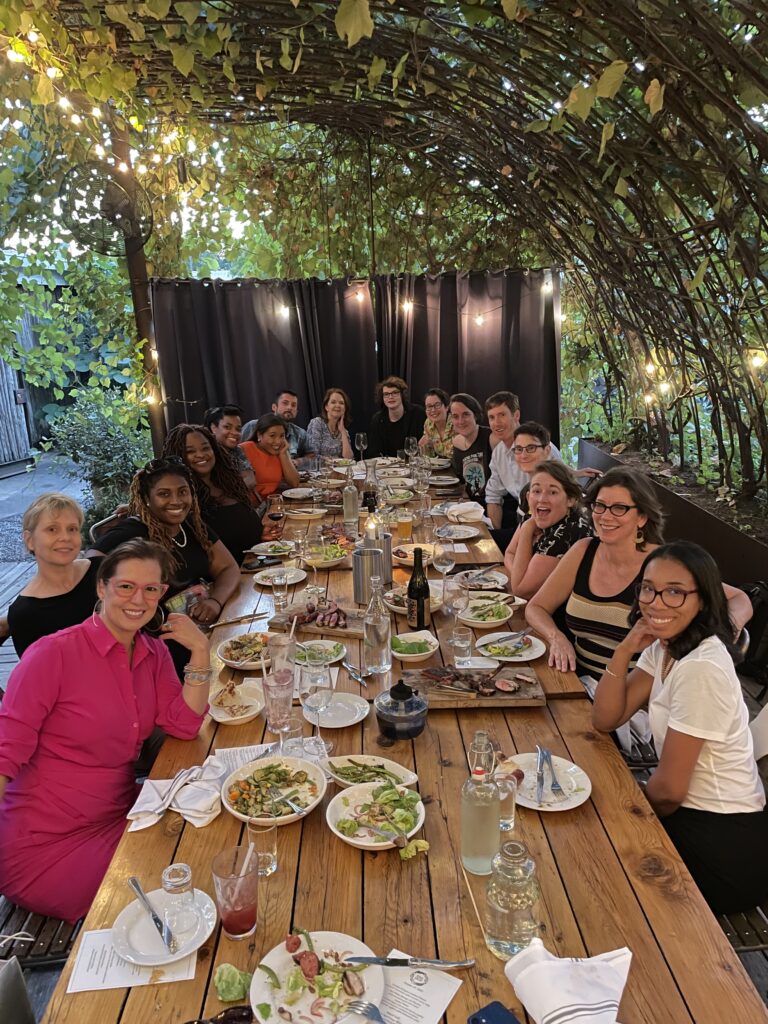by L. Nelson Leonard

conference celebration dinner
In early October, Dr. Chad Seales and the Department of Religious Studies welcomed scholars to the 2022 “Material Religions in the Americas” conference. In accordance with this year’s theme (“The Social Order of Things”), participants were challenged to creatively reimagine the politics, practices, and theoretical significance of material objects across religious spaces and communities. Each scholar offered an individual case study, attending to a specific theme in or across time that highlights connection(s) between object and belief.
Dr. Seales opened the conference with a discussion of the role that transitional phenomena play in materializing the religious and spiritual. His remarks set the stage for the following presentations:
Scented Magic: The Sweet Life of Florida Water Perfume in African Diaspora Religion, Khytie Brown (UT Austin)
“Good and Bad Ritual”: Adapting Nahua Divination to Colonial Life in Central Mexico, Josefrayn Sanchez-Perry (Loyola University Chicago)
An Altar of Cardboard Boxes, Jennifer Graber (UT Austin)
Black Brujería and Tarot at the Crossroads of Puerto Rican Catastrophe: An Experimental Paper, Ashley Coleman-Taylor (UT Austin)
Revealing Haitian Vodou in Bodily Tattoos, Eziaku Nwokocha (University of Miami)
Teepee: Guyanese American Reflections on Religion and Spirituality, Rupa Pillai (University of Pennsylvania)
Migration and/as Religion: The Entanglement of Modern Conceptions of Religious Difference and Citizenship, J. Brent Crosson (UT Austin)
African-Descended Women, Witchcraft, and the Religious Afterlives of Salem, Alexis Wells-Oghoghomeh (Stanford University)
Complicating the Cross: (Dis)Entangling Animacy in Taki Onqoy and Catholic Religious Practice, Scotti Norman (Warren Wilson College)
Severing Ties: Hmong Religious Change, Community Conflict, and the Contested Meaning of Ritual Objects, Melissa Borja (University of Michigan)
Blackened Maize, Burned Coffee, and Reciprocity in Highland Guatemala, Mallory Matsumoto (UT Austin)
Shape-shifters: Sacramental Silver and the Body of Christ, Michelle Molina (Northwestern University)
Space Age Religion: The UFO as Transitional Object, Kelly Hayes (IUPUI)
The conference structure allowed scholars and participants to engage in cross-disciplinary dialogue with each other after every talk. This workshop component generated dynamic, constructive feedback in real-time.
The concluding session featured a series of keynote talks by Kathryn Lofton (Yale University), Anne Pellegrini (New York University), Tracy Fessenden (Arizona State University), and Elizabeth Perez (UC Santa Barbara). Dr. Lofton offered an analysis of ‘cancel culture,’ applying the logic of transitional phenomena to survey the state of academia and its placement in American culture more broadly. Dr. Pellegrini pivoted the conversation toward the tension between subject and object through a close reading of Winnicott’s theory of transitional phenomena. By returning the focus to transitionality itself, they resurfaced the organizing framework and purpose of the conference. The last two presentations, delivered by Dr. Fessenden and Dr. Perez, addressed that larger theory by emphasizing the power of transitional objects in extra-religious settings.
Sponsored by the Henry Luce Foundation, the 2022 “Material Religions in the Americas” conference incubated new ideas around the larger theories, processes, and questions of how transitional phenomena materializes religion in the Americas.
L. Nelson Leonard is a Ph.D candidate who focuses on cultural intersections of race and religion in American culture. They are particularly interested in how and why religion produces and/or deals with “the problem child.” Their work also considers the ways that digital technologies offer spaces for diasporas to connect and form meaningful communities. LNL brings these two interests together in their dissertation, which explores how transnational/racial adoption disrupts cultural norms of religious family and family making in the United States.
